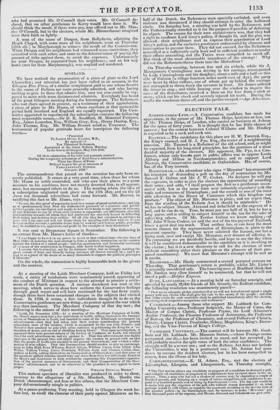At a meeting of the Leith Merchant Company, held on
Friday last week, a series of resolutions were unanimously passed, approving of the conduct of Ministers in respect to the attempt to procure a settlement of the Dutch question. A curious document was read at the meeting, which serves to show how uniform the Conservative feelings through good report and evil have continued for the last forty years, though there have been occasional changes in the subjects that excited them. In 1793, it seems, a few individuals thought fit to do as the Conservative gentlemen are now doing—to protest against the war which was then imminent. The Merchant Company of that day met ; the following is the minute of their meeting
" Leith, 7th December 1793.—At a meeting of the Merchant Company of Leith, the Master represented that a few individuals in Leith, calling themselves the Incorporation of Shoemakers in Leith, had inserted in some of the Edinburgh newspapers an advertisement—that they had taken into their serious consideration the present calamitous state of the country, which is occasioned by the war with France; and therefore they resolved to join with other societies in petitioning the King for a • restoration of peace, and an end of shedding human blood.' That upon investigation, it appeared there were present sixteen of the Society of Cordiners in Leith. ten whereof voted for such advertisement, and six against it. That this advertisement was highly improper at the present time, and might impress the country in general with an idea that the people of Leith were enemies to the present Government, and wished a reformation in state affairs. That this Incorporation should resolve to give no encouragement to John Hall, Peter M'Laren, Robert Aitken, William Users, John Elliot, John Millar, William Young, James Dennison, William Scott, and Thomas Carlin, shoemakers in Leitie calling themselves an Incorporation of Shoemakers ; aml that none of the members oritheir families should take any shoes from these ten individuals. Remit to the Master and Assistants to form resolutions expressing this Corporation's approbation of the present measures of Government, and their disapprobation of the Shoemakers' advertisement, and to do otherwise in the premises as may appear to them Proper.
(Signed) WILLIAM DOUGLAS, MRSICI."
This curious specimen of liberality was produced in order to show, contrary to the allegations of a Mr. Murdoch, Mr. Hardie the Dutch cheesemonger, and four or five others, that the Merchant Company did occasionally mingle in politics.
At a peace-professing Tory meeting, held in Glasgow the week before last, to swell the clamour of their party against Ministers on be
half of the Dutch, the Reformers were specially excluded, and even violence was threatened if they should attempt to enter the hallowed circle. On Saturday last, a meeting was held by the Reformers, and the Tories actually crowded to it for the purpose if possible of defeating its object. The excuse for their own exclusiveness was, that they had a right to condemn Lord Grey's policy, if thought fit, and the plea was allowed : their neighbours met to express their approbation of Lord Grey's policy, and the exclusive gentlemen endeavoured by clamour and interruption to prevent them. They did not succeed, for the Reformers assembled at a sufficiently early hour and in sufficient numbers to render their efforts unavailing, and the Tories were compelled to sneak off. But think of the most abominable impudence of the attempt ! Why did not the Reformers throw them into the Molindinar ?
On Thursday evening, between five and six o'clock, while Sir J. Montgomery Cunninghame was driving in his carriage, accompanied by Lady Cunninghame and his daughter, about a mile and a half on this side of Galston [a village fourteen miles north-east of Ayr], the party were beset by three ruffians, one of whom got up behind the carriage and attempted to throw down the servants in front. Sir James ordered the driver to stop ; and while leaning over the window to inquire the cause of the disturbance, received a blow on the face from a stick or stone, which cut his cheek and severely injured his teeth. During the scuttle the coachman drove off, and the parties escaped.—Ayr Advertiser.


























 Previous page
Previous page